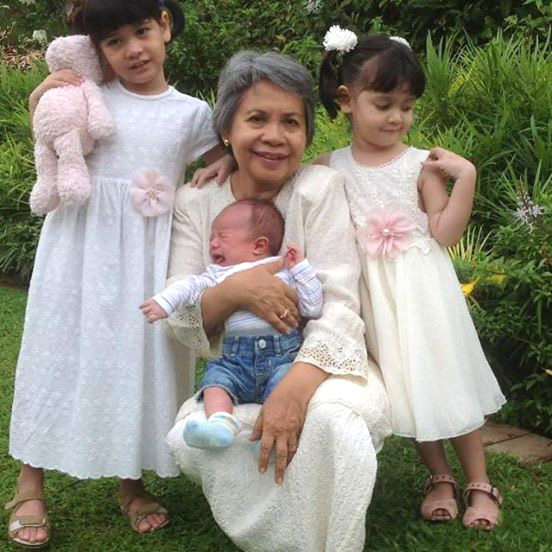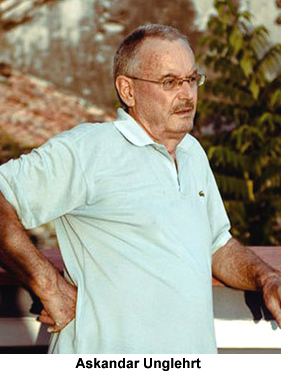
Tengku Idaura, Malaysian Princess
June 29, 2009

|
Idaura and her grandchildren
With a sweet voice, shy smile, and keen look, Tengku Idaura speaks perfect French ... and she elegantly tells a life of adventure straight out of a large picture book filled with the bright colors and unique brilliance of Malaysia. An evocation that could have inspired a Rudyard Kipling or a Joseph Conrad ... the colonies, the tropics, the kingdoms with their rajas and their sultans, extended families, marriages, divorces and concubines...
Direct heir of these distant times Tengku Idaura could have been a talented storyteller. "My mother is from the nobility of northern Malaysia, because my great-grandfather, a Raja from Pattani province, which was still part of the Kingdom of Malaysia (now Thailand), was married to the daughter of the Sultan of Kelantan. I was born in my grandfather's palace."
Narrated in the courtyard of a large traditional Chinese residence in Penang, the Cheong Fatt Tze House, named after the first Chinese Vice-Consul appointed by the Emperor of China in the nineteenth century, the story of the princess takes you back a century...
"I remember my grandfather, an authoritative and wealthy man who ruled the whole family in a Malay-style palace, one built entirely of wood, without a single screw or nail, and surrounded by vegetation and small houses. In fact, it was a kind of big complex housing the community, the kampong, with the families of the different women of my grandfather who stayed each in a house with their children. My grandfather had given a house to my mother. I also remember the huge kitchen at the back of the house and the cooks, and even further behind another building where rice was stored, the small houses of the servants and their families ..."
The eyes of Idaura suddenly darken and are lost as if in a mysterious dream: "I am sad because the house has been sold. In 1956, just before the independence of Malaysia, my grandfather died and the house was left abandoned ... He was a hard and traditional man, but he had succeeded in business, owned land and was the first Malaysian to start rubber plantations in the 1920s and convert to palm oil when rubber prices fell."
After the divorce of her parents when she was six, Idaura left the northern Malaysia state. It had been "comfortable but a little isolated," where teachers had to be brought to the home to teach her mother. "My mother had enough and wanted me to have a good education and good teaching. So she encouraged me to study in Kuala Lumpur. She was a visionary! She was one of Kelantan's first women to be educated in English. She begged her father to do this revolutionary thing and send her to an English school ... In the 1930s, you imagine! It was a scandal. He, a Muslim notable, raising his daughters in a Christian school ... But my mother was successful and now I in turn found myself at the age of six in a boarding school in Kuala Lumpur!"
Serious and brilliant at school (she attended the V.I. in 1962-63), Idaura entered the University of Malaya, the only one in the country in the 1960s, and graduated with a degree in geography. But in her curriculum she took a French language course. "I loved that language," she says today. "There were a few words of French that I had found in Anglo-Saxon literature which had intrigued me. My teacher, a Frenchman, encouraged me to apply for a scholarship to study in France ... I had had enough of University exams, but he kept insisting. So four students applied, including myself. I was lucky, because I was the only one to get it among the four."
She admits that at the time, alone in Paris,
life was not simple: "I was very shy and very alone in this big
 city, she recalls. I had spent a year in Southern California the
year before, my first experience abroad, but it was not easy in
Paris. Between classes at the Sorbonne and the Pantheon, I studied
"tourism development." I did not understand anything. I was taking
French classes at the Alliance Française at Boulevard Raspail,
but I was depressed. It was swarming with students, the boys were
chasing girls. I was isolated, very lonely."
city, she recalls. I had spent a year in Southern California the
year before, my first experience abroad, but it was not easy in
Paris. Between classes at the Sorbonne and the Pantheon, I studied
"tourism development." I did not understand anything. I was taking
French classes at the Alliance Française at Boulevard Raspail,
but I was depressed. It was swarming with students, the boys were
chasing girls. I was isolated, very lonely."
Until Idaura met the man who would become her husband a few years later. It was a young German studying French in Paris, who changed her life. "I then passed my license to teach French abroad (EFE). People were good and I made friends. My level of French allowed me to take my master's degree at the Center for Higher Tourism Studies and I returned immediately to Malaysia, but not to Kuala Lumpur nor Kelantan, but to the island of Penang where my future husband had found a post of French teacher at Penang University of Science. Then we got married."
A courageous step in those times when mixed marriages were not so common, on the one hand with a non-Muslim man, but moreover a Westerner, in a country where the official religion was Islam. "My mother was not thrilled to see me married to a Westerner and I remember hearing her say to my future husband: "If you tell me you come to Penang and can live here, that's okay." And my husband and I have now lived here for thirty-five years!"
Askandar Unglehrt converted to Islam in 1973, followed religious and Quran studies, but did have to pass an exam on it, as is the case today. "For the ceremony, we called the mufti of Kota Bahru in Kelantan," Idaura says, "my father was there representing me, I was at a distance but could hear everything. She calls herself a "practicing" Muslim, praying five times a day, observing the fast of Ramadan, giving money to the poor each year, and she went to Mecca last month. "I wore a scarf on my head for twenty-five years as a mark of modesty. I have removed it now ... Who will look at me today, I'm too old!" Idaura exclaims, bursting into laughter.
"You know, we practice a very tolerant form of Islam, but we also have conservatives and extremists, immersed in prayer, and isolated, who do not communicate, but it's okay..." It is true that in Penang, there is a very strong Chinese community dating back two hundred years. There is a mixture of ethnicities and religions in surprising harmony. Aware of this wealth, Idaura has worked in the preservation of the cultural and religious heritage of Penang, colonial buildings, traditional houses, old hotels...
"My experience in France has been behind my quest to revive these local riches," she says. Her commitment to the French Alliance of Penang for thirty-five years led her to receive, two years ago, the National Order of Merit from the French Ambassador. Yet Idaura has only one regret: "I have not managed to preserve the palace of my great-grandfather."
[Translation]
___________________________________________
Education:
Malay Girls' College, KL (now Kolej Tunku Kurshiah ) 1956 - 1961
Victoria Institution 1962 - 1964
Arcadia High School, California USA 1962/63
University of Malaya 1965 - 1968 Bachelor of Arts ( Geog.)
University of PARIS (Sorbonne-Pantheon) 1968 - 1971 Masters in Tourism Development
Career:
Tourism Development Corporation of Malaysia 1972 - 1973
Penang Development Corporation 1973 - 1996
- Asst. Director, Tourism Promotion 1973 - 1978
- Manager, Industry and Tourism Promotion 1978 - 1981
- Manager, Urbanisation and Housing Division 1982 - 1990
- Deputy General Manager 1991 - 1995
CEO PDC subsidiary company 1996 - 2003
Director/Curator Penang Botanic Gardens Aug 2010 - Sept 2011
Study Awards:
JPA-JICA Executive Devt. Programme Tokyo 1987
Management Devpt Programme, Asian Inst. Of Management Manila 1991
Duncan Sandys Scholarship for Conservation - United Kingdom 1993
Study Tour of the Nantes Conservation area, France 1993, by the French Government
Other involvements:
Chairman, Penang Heritage Centre 1995 - 2003
President , Friends of the Penang Botanic Gardens Society 1996 - 2009, 2011 - 2019
President, Alliance Française de Penang 1995 - 2006
Trustee / Chairman Tadika Perkim Pulau Pinang since 2000
Member of Silver Jubilee Home for the Aged Management Commitee 1995 - 2006
Responsible for the restoration for adaptive re-use of Government buildings 1995 - 1999
e.g. Hotel 1926; (awarded The Most Excellent Project for Adaptive Reuse by Badan Warisan Malaysia)
Burma Square and Wakaf properties on Lebuh Buckingham, and the upgrading project of Lebuh Acheh-Lebuh Armenian-Lebuh Canon
Member of Technical Review Panel Majlis Bandaraya Pulau Pinang since 2011
Honours:
DSPN by State Govt of Penang 1995
L'Ordre de Mérite by President of France 2004
 The V.I. Web Page
The V.I. Web Page